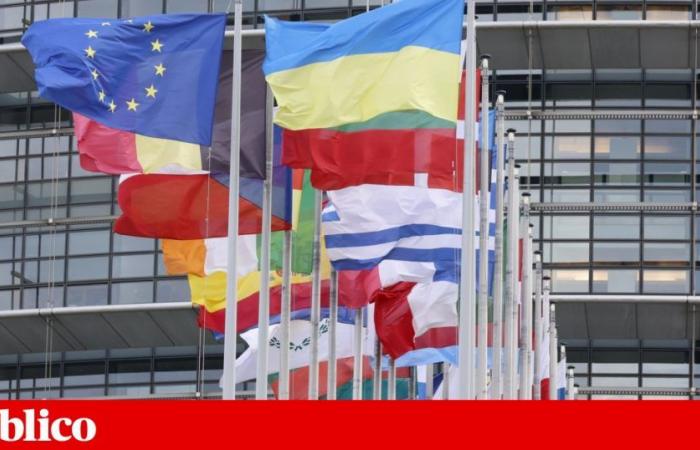
The secret services of Poland and the Czech Republic discovered, at the end of March, a Russian network that, allegedly, aimed to influence the results of the European elections, which take place between 6 and 9 June. The same network, according to the international press, was responsible for the operation of the site news channel Voice of Europe, known for “giving voice to Eurosceptic politicians and spreading pro-Russian narratives”, as Jan Fridrichovsky, editor-in-chief of Demagog.cz, a news platform, explained to PÚBLICO. fact-checking check.
In addition to managing the sitethe same team had “allegedly (according to Czech media who covered the story — Dení K, Seznam Zprávy, among others) paid European politicians to spread pro-Russian narratives and organized conferences and events to support certain right-wing politicians radical”.
Petr Bystron, candidate for the German populist party AfD at the Europeans, is, according to the Czech newspaper Deník N and the German magazine Der Spiegel, one of the politicians who received money from Voice of Europe. Bystron, however, denied all allegations to Reuters: “I have never received any payments in cash or cryptocurrencies from a Voice of Europe (or any Russian) employee.”
Belgian Prime Minister Alexander de Croo and Czech Prime Minister Peter Fiala confirmed in a letter sent to the European Council (published in X) that Belgian secret services had discovered “a pro-Russian interference network” operate in the country. The network’s objectives include “promoting cooperation between pro-Russian politicians within the European Parliament” and “helping to elect more pro-Russian candidates in the European Parliament”.
“It is clear that the Russian regime is trying to influence the upcoming European elections and strengthen the pro-Russian narrative in the new European Parliament,” the letter reads.
According to French minister Jean-Noël Barrot, Russian propaganda has also spread in France. To the regional newspaper Ouest-Francethe minister said that “there is not a week in which France is not the target of coordinated and deliberate maneuvers with the aim of damaging public debate and interfering in the campaign for the European elections”, quotes the The Guardian.
Czech government sanctioned Voice of Europe and Viktor Medvedchuk
The Czech authorities even shut down Voice of Europe, and the Government announced that the site would be placed on a sanctions list.
Jan Fridrichovsky explains that the connection between the site of news and the alleged payments to European politicians: “The SIS [serviços secretos da República Checa] didn’t give many details about this. However, it is believed that the management of site and the payments to politicians were two parts of the influence operation carried out by the same people.”
After being unavailable for a few days, Voice of Europe is now available again online. O sitewhich operated from the Czech Republic before being blocked, will now be hosted in Kazakhstan, according to Euroactiv.
In addition to Voice of Europe, the Czech Government also included the names of Viktor Medvedchuk and Artem Marchevsky on the sanctions list.
The first is a pro-Kremlin Ukrainian oligarch, member of Putin’s inner circle (the Russian President is even godfather to Medvedchuk’s daughter). In 2022, he was exiled to Russia in exchange for Ukrainian prisoners of war and lost his Ukrainian citizenship. Medvedchuk was the leader of the Opposition Platform — For Life party, one of the parties suspended in Ukraine.
Israeli Artem Marchevskyi, according to Reuters, led Voice of Europe under the guidance of Medvedchuk.
According to Le Monde, There is also a Polish man accused of spying for the Russian secret services and bribing MEPs in order to increase Russian influence in Europe.
How does a campaign like this develop?
“These disinformation campaigns are truly complex and sophisticated”, begins by pointing out Joana de Deus Pereira, researcher at the Royal United Services Institute (RUSI), specialist in Counterterrorism and Preventing and combating violent extremism. “The planning and execution of these campaigns are not isolated or random acts; follow a meticulously crafted strategy that aims to maximize the impact and penetration of disinformation messages. This includes identifying specific groups within society that may be more susceptible or receptive to certain narratives,” she explained to PÚBLICO.
In the opinion of the Portuguese expert, the “main risk” of a campaign of this type is not limited to the “erosion of trust in democratic institutions and the electoral process”. In the long term, successive disinformation attacks could even compromise the cohesion of the EU. “This is a bit like putting a hole in an air mattress. The mattress doesn’t burst, but it collapses over time,” she compares.
Even before the investigations into Voice of Europe, Josep Borrell, the European Union’s High Representative for Foreign Policy and Security, had already expressed concern about the phenomenon. “Disinformation and propaganda organs are a weapon of the Kremlin today,” he said in February.
“Democracy is a system that is based on the information that people have, because they make their choices — political choices — according to their own perception and the information they receive about what is happening in the rest of the world”, summarized.
Joana de Deus Pereira argues that the protection of institutions depends on a robust approach on several fronts. It will have to include “stakeholders with responsibility in the transparency criteria”, the accountability of social networks and greater “surveillance over financial transactions within political circles to prevent hidden/undesirable financing”. It is also urgent to invest in “cybersecurity measures to safeguard against digital interference”.
In addition to Russia, China
It is possible that, in a more or less distant future, it will not be just Russia trying to interfere in European democratic processes. In 2022, Ivana Karáskováfrom the Central European Digital Media Observatory (CEDMOin its acronym in English), warned of the need to pay attention to China, in the document Confluence between Russian and Chinese information operations in European information space (“Confluence between Russian and Chinese information operations in the European information space”).
“With relations between the United States and China and between the EU and China deteriorating, it is likely that China will intensify, in the future, campaigns aimed at disrupting what they consider to be the Western dominance of traditional narratives”, reads the document that warns that, “until now, Europe has paid little attention to Chinese information operations in the European information space”.
Seven months before the elections in the USA, the country can already be seen as an example of what could happen in the future, on the European continent. According to the New York Timesare already circulating online profiles that pretend to be Trump supporters, but which in fact were created by Chinese accounts. The objective is to spread conspiracy theories, create divisions in American society and harm public opinion about Joe Biden’s performance.
The operation known as Spamouflage it had been identified in 2019 by the company Graphika and the Institute for Strategic Dialogue when it was used against demonstrations opposing China’s interference in the governance of Hong Kong. In the United States, the campaign has evolved and is increasingly similar to the Russian interference campaign that took place in the 2016 US presidential elections.
For Joana de Deus Pereira, what has been seen abroad “reinforces the need for continuous vigilance and a proactive response on the part of European institutions, to anticipate and mitigate potential attempts at influence”.
*With Ivo Neto
Tags: Russian disinformation network reportedly paid politicians influence European elections Misinformation
--




